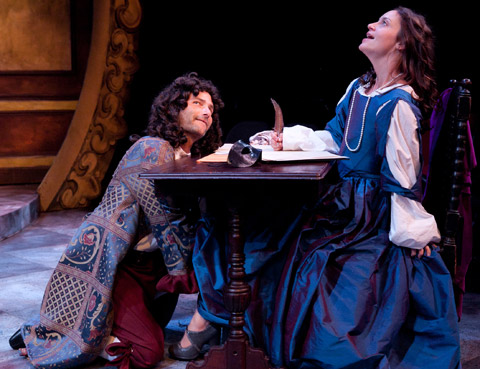
AHISTORICAL Liz Duffy Adams’s play conjures a Restoration-era London with cell phones and “good
weed.” |
"All women together ought to let flowers fall upon the grave of Aphra Behn," Virginia Woolf famously opined. Liz Duffy Adams's dramaturgical homage, Or,, is more florid than floral and sometimes clever bordering on cute. But the play, being given a brisk area premiere by the Lyric Stage Company of Boston (through November 6), is ingenious. Built on a slim foundation of historical fact, Adams's period farce about the first lady of Restoration comedy not only captures the arch, bawdy air of Behn's oeuvre; it also draws parallels between Restoration London (enjoying a creative spring in the wake of Puritan repression, bubonic plague, and the Great Fire) and more recent periods of hope and license, including the 1960s. At the same time, Or, is a sort of badinage-à-trois in which burgeoning playwright Behn, the popular actress Nell Gwynne, and "merry Monarch" Charles II hop in and out of bed when not challenging one another to rampant runs of rhyme.Entering in period costume but talking on a cell phone, actress Stacy Fischer gets things rolling by explaining the play's blunt, arguably obscure title. This whittling down of the popular literary labeling of the day, from Shakespeare's Twelfth Night, or, What You Will to Behn's The Rover, or, The Banish'd Cavaliers, also suggests the diametric ambiguity of all things, from male/female and gay/straight to "cheap hackney trash or art."
After pronouncing that "we all embody opposites within," Fischer ditches the 21st-century communication device and climbs into the persona of Behn, circa the mid-1660s, languishing in debtors' prison while firing off furious couplets at the king, who has failed to pay her spying wages. (Behn, considered the first English woman to earn her living as a writer, did precede her literary career with a stint of espionage.) In Adams's re-imagining, it is Charles himself who turns up, masked, to discharge her debts and make a pass at her. Here Adams brandishes her poetic license: Behn was not, to our knowledge, among Charles's many mistresses. The orange-seller-turned-Dryden diva Nell Gwynne, celebrated for her comic acumen and breeches roles, was — though it's unlikely the pair's first tryst was chez Behn while the dramatist dealt with ex-lover and fellow spy William Scott, suddenly turned up with dubious information about a Catholic plot to kill the king.
Throughout the play, which begins coyly but develops a rollicking head of steam, Adams, in service to her theme, suggests a mash-up of eras. Gwynne, sharing a pipe with Behn before they move on to girl talk and kisses, remarks, "Good weed." The terms "swing both ways" and "fuckwit" also find their way among the more flowery phonemes. This isn't just a stunt, however. Adams wants to emphasize that Behn was ahead of even this liberal, arguably libertine era, when the theaters had reopened and women were allowed onstage for the first time. Though possessed of a libido that she generously smeared across page and stage, Behn chose career and monetary independence over either sexual wiles or sexual submission. "I'm no kind of whore," she says, "the kind that marries or the other kind."